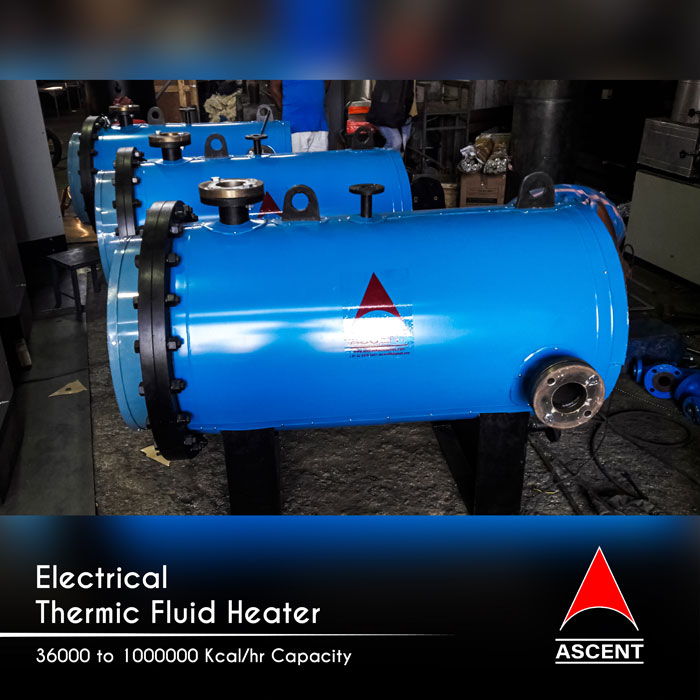Electrical Thermic Fluid Heater 400000 kcal/hr
manufacturer, supplier, exporter in Mumbai, India
Table of Contents

Description of Electrical Thermic Fluid Heater 400000 kcal/hr
An Electrical Thermic Fluid Heater 400000 kcal/hr is a high-capacity heating system that is used in various industrial applications to heat process fluids. The system operates on electricity and uses a thermal fluid as a heat transfer medium to transfer heat to the process fluid. The thermal fluid is heated by the heating elements in the system, and it flows through a closed-loop system that circulates the fluid to the process equipment.
The Electric Thermic Fluid Heater offers several advantages over traditional heating systems that use fossil fuels. It is an energy-efficient system that operates on electricity, which eliminates the need for burning fossil fuels. The system provides precise temperature control, which ensures consistent and accurate heating of the process. It can operate at high temperatures without producing emissions or polluting the environment, making it an eco-friendly option.
This heating system has a capacity of 400000 kcal/hr, which means that it can generate up to 400000 kilocalories of heat per hour. This makes it suitable for applications that require high-temperature heating, such as chemical processing, food processing, and pharmaceutical manufacturing.
Electrical Thermic Fluid Heater 400000 kcal/hr Features
The Electric Thermic Fluid Heater with a capacity of 400000 kcal/hr comes with various features. Some of the notable ones are:
- Accurate temperature control: Electric Thermic Fluid Heater provides precise temperature control, which ensures consistent and accurate heating of the process. The system can maintain a constant temperature, which is crucial for many industrial applications.
- Energy efficiency: Electrical Thermic Fluid Heater 400000 kcal/hr is an energy-efficient heating system. The system uses electricity to heat the fluid, which eliminates the need for burning fossil fuels, thereby reducing energy consumption and cost.
- High-temperature heating: Fluid Heater can operate at high temperatures without producing emissions or polluting the environment. The system is suitable for applications that require high-temperature heating, such as reactor heating, sterilization, and drying.
- Safer and cleaner substitute: Thermic Heater is a safer and cleaner alternative to traditional heating systems that use fossil fuels. The system does not produce emissions of pollutants, which makes it an eco-friendly option.
- Easy maintenance and installation: Electric Heater is easy to install and maintain. The system requires minimal maintenance, and it’s simple design makes it easy to troubleshoot and repair.
Electrical Thermic Fluid Heater 400000 kcal/hr Applications
Electrical Thermic Fluid Heater with a capacity of 400000 kcal/hr is a widely used heating system in industries. Here are some of the applications of this heating system:
- Crude oil production: The Electrical Thermic Fluid Heater is used to heat the crude oil during production to lower its viscosity, which makes it easier to transport. This heating system is also used to heat the water used in steam injection processes, which helps to improve oil recovery rates.
- Refining: The Thermic Heater is used in various stages of oil refining to heat the process fluids, such as crude oil, to the required temperatures. This heating system is used to heat the feedstock to the distillation column, which is used to separate crude oil into different fractions. The system is also used to heat the catalysts in the catalytic cracking process.
- Tank heating: The Fluid Heater is used to heat the crude oil tanks to maintain the required temperature for optimal crude oil storage. This heating system is also used to heat the pipelines that transport the crude oil from the production site to the refinery.
- Waste oil treatment: The Electrical Heater is used to heat the waste oil during the treatment process to remove impurities and contaminants. This heating system is also used to heat the water used in the treatment process, which helps to reduce the treatment time.


